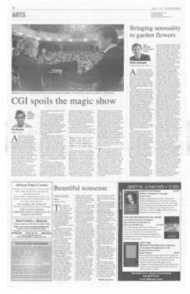Page 3, 9th March 2007
Page 3

Report an error
Noticed an error on this page?If you've noticed an error in this article please click here to report it.
Tags
Share
Related articles
Bishops Grow Nervous Over Charity Reforms
The Charities Act Poses No Threat To Beliefs
The Catholic Herald
Main Religions `should Stay As Charities'
Parish Audits Should Not Strike Fear In The Heart Of Our...
Charity law overhaul poses `threat' to Catholic causes
Religious orders and Christian charities face 'public benefit' tests to retain charitable status
BY FREDDY GRAY
THE DIRECTOR of a leading Catholic charity has said that new laws could pose a threat to religious charities, forcing them to hand over millions of pounds in tax.
Neville Kyrke-Smith, director of Aid to the Church in Need, a charity that helps persecuted and suffering Christians across the world, told The Catholic Herald that although this week's Charity Commission Consultation document did not "immediately endanger" religious groups, it could be used as a "tool to target certain charities".
He said: "This might eventually come to mean that we, as independent charities, have to toady up to the Government in order to retain our charitable status, in the way that some of the larger charities already do toady up to the Government."
Christian charities have traditionally been granted tax relief because religious work was "presumed" to be beneficial to the public.
However, the new Charities Act, passed in November 2006, abolished this clause.
In future, all charities will have to prove to the Charity Commission that the public benefits from their work in order to retain charitable status.
A consultation document explaining how the new rules work was published this week amid concerns that the Government was attempting to use the Charity Commission to increase its control of the voluntary sector.
"As soon as you start to tread on this, you get a political correctness, or even a religious correctness, that could be used to attack certain charities," said Mr KyrkeSmith.
"We feel this might be used as a sort of off-stage threat to independent charities."
He argued that some Aid to the Church in Need projects, such as its work in Pakistan, where it supports an embattled Christian minority against persecution from the Muslim population, could be seen from a secularist viewpoint as "divisive". However, Belinda Pratten, senior policy officer for the National Council for Voluntary Organisations, said that the "public benefit test" was not designed to hamper independent charities.
"I think it is more important to ensure that the public has trust in the voluntary sector," she said.
Enclosed Catholic orders in England and Wales fear that new laws could strip them of their charitable status and force them to pay millions of pounds to the taxman. Dame Abbess Paula Fairlie of the Benedictine nuns in Curzon Park, Chester, said she was worried about demonstrating precisely how the work of the sisters, which involves offering their land for private retreats, could benefit the public.
"You are really asking me to prove that something intangible like air and sunshine and prayer are for the benefit of humankind,".she told BBC Radio 4's Sunday Programme.
"The obvious answer is that they are so obviously beneficial that you take them for granted."
But Suzi Leather, chairwoman of the Charity Commission, insisted that religious organisations should not be alarmed. "Let me reassure organisations in advance that I see no reason why most of these organisations should not be able to retain charitable status," she said.
"I think it is very important we don't assume that simply because something is intangible that it is not identifiable and it is not of public benefit."
Miss Leather did admit that "prayer by itself" was not sufficient. "For completely closed religious communities which have no contact with the outside world, it will be very difficult for them to retain charitable status," she said.
But closed communities such as St Hugh's Charterhouse, Parkminster, West Sussex, have not had charitable status for several decades precisely because they did not offer a visible public service.
"This is very much a postReformation thing," said Mr Kyrke-Smith.
"A refusal to acknowledge that prayer can have any use whatsoever."
However, now even Catholic monasteries and convents which help the outside world are worried.
In future, monks and nuns will have to show not only that they "advance religion" — which for centuries has been enshrined in law as as charitable cause — but also that their work benefits the public.
"We are very concerned about this," said Sister Zita of the Blessed Sacrament Convent, Sussex. "We will be keeping our ears very close to the ground."
blog comments powered by Disqus

















